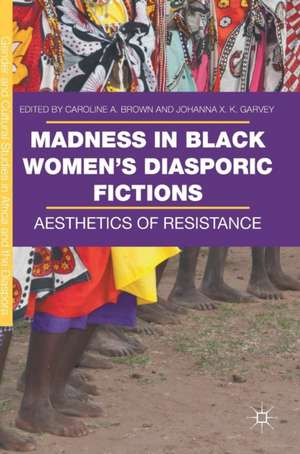Madness in Black Women’s Diasporic Fictions: Aesthetics of Resistance: Gender and Cultural Studies in Africa and the Diaspora
Editat de Caroline A. Brown, Johanna X. K. Garveyen Limba Engleză Hardback – 16 noi 2017
The volume is constructed in three sections: Revisiting the Archive, Reinscribing Its Texts: Slavery and Madness as Historical Contestation, The Contradictions of Witnessing in Conflict Zones: Trauma and Testimony, and Novel Form, Mythic Space: Syncretic Rituals as Healing Balm. The novels under review re-envision the initial trauma of slavery and imperialism, bothacknowledging the impact of these events on diasporic populations and expanding the discourse beyond that framework. Through madness and healing as sites of psychic return, these novels become contemporary parables of cultural resistance.
| Toate formatele și edițiile | Preț | Express |
|---|---|---|
| Paperback (1) | 780.82 lei 6-8 săpt. | |
| Springer International Publishing – 23 aug 2018 | 780.82 lei 6-8 săpt. | |
| Hardback (1) | 786.04 lei 6-8 săpt. | |
| Springer International Publishing – 16 noi 2017 | 786.04 lei 6-8 săpt. |
Preț: 786.04 lei
Preț vechi: 958.59 lei
-18% Nou
Puncte Express: 1179
Preț estimativ în valută:
150.40€ • 157.48$ • 124.75£
150.40€ • 157.48$ • 124.75£
Carte tipărită la comandă
Livrare economică 09-23 aprilie
Preluare comenzi: 021 569.72.76
Specificații
ISBN-13: 9783319581262
ISBN-10: 3319581260
Pagini: 404
Ilustrații: XI, 326 p.
Dimensiuni: 148 x 210 x 27 mm
Greutate: 0.56 kg
Ediția:1st ed. 2017
Editura: Springer International Publishing
Colecția Palgrave Macmillan
Seria Gender and Cultural Studies in Africa and the Diaspora
Locul publicării:Cham, Switzerland
ISBN-10: 3319581260
Pagini: 404
Ilustrații: XI, 326 p.
Dimensiuni: 148 x 210 x 27 mm
Greutate: 0.56 kg
Ediția:1st ed. 2017
Editura: Springer International Publishing
Colecția Palgrave Macmillan
Seria Gender and Cultural Studies in Africa and the Diaspora
Locul publicării:Cham, Switzerland
Cuprins
Chapter 1. Introduction: Women, Writing, Madness: Reframing Diaspora Aesthetics – Caroline A. Brown.- Chapter 2. Resisting Displacement in Bernardine Evaristo’s The Emperor’s Babe – Nancy Caronia.- Chapter 3. Madness and Translation of the Bones-as-text in Marlene NourbeSe Philip’s Experimental Zong! – Richard Douglass-Chin.- Chapter 4. Embodied Haunting: Aesthetics and the Archive in Toni Morrison's Beloved – Victoria Papa.- Chapter 5. Fissured Memory and Mad Tongues: The Aesthetics of Marronnage in Haitian Women’s Fiction – Johanna X. K. Garvey.- Chapter 6. Dark Swoops: Trauma and Madness in Half of a Yellow Sun – Seretha D. Williams.- Chapter 7. “We Know People By Their Stories”: Madness, Babies, and Dolls in Edwidge Danticat’s Krik? Krak! – Raquel D. Kennon.- Chapter 8. Sharazade’s Sisters and the Harem: Reclaiming the Forbidden as a Site of Resistance in Toni Morrison’s Paradise – Majda R. Atieh.- Chapter 9. Magic, Madness and the Ruses of the Trickster: Healing Rituals and Alternative Spiritualities in Gloria Naylor’s Mama Day, Erna Brodber’s Jane and Louisa Will Soon Come Home, and Nalo Hopkinson’s Brown Girl in the Ring – Caroline A. Brown.- Chapter 10. “Recordless Company”: Precarious Postmemory in Helen Oyeyemi’s The Icarus Girl – E. Kim Stone.- Chapter 11: Conclusion: Moving Beyond Psychic Ruptures – Johanna X. K. Garvey.
Notă biografică
Caroline A. Brown is Associate Professor of English Literature at the University of Montreal, Canada. She is author of The Black Female Body in American Literature and Art: Performing Identity (2012). Her articles have appeared in African American Review, Comparative Studies of South Asia, Africa, and the Middle East, National Women’s Studies Association Journal, and several other journals and edited collections.
Johanna X. K. Garvey is Associate Professor of English at Fairfield University, USA, where she was founding Co-Director of the Women’s Studies Program and the Program in Black Studies: Africa and the Diaspora. She has published on Ann Petry, Michelle Cliff, Merle Collins, Paule Marshall, Dionne Brand, Shani Mootoo, Patricia Powell, Maryse Condé, and others, in Callaloo, The Journal of Commonwealth and Postcolonial Literature, Textual Practice, Anthurium, and elsewhere. She is completing a book manuscript on Caribbean women writing diaspora.
Johanna X. K. Garvey is Associate Professor of English at Fairfield University, USA, where she was founding Co-Director of the Women’s Studies Program and the Program in Black Studies: Africa and the Diaspora. She has published on Ann Petry, Michelle Cliff, Merle Collins, Paule Marshall, Dionne Brand, Shani Mootoo, Patricia Powell, Maryse Condé, and others, in Callaloo, The Journal of Commonwealth and Postcolonial Literature, Textual Practice, Anthurium, and elsewhere. She is completing a book manuscript on Caribbean women writing diaspora.
Textul de pe ultima copertă
This collection chronicles the strategic uses of madness in works by black women fiction writers from Africa, the Caribbean, Canada, Europe, and the United States. Moving from an over-reliance on the “madwoman” as a romanticized figure constructed in opposition to the status quo, contributors to this volume examine how black women authors use madness, trauma, mental illness, and psychopathology as a refraction of cultural contradictions, psychosocial fissures, and political tensions of the larger social systems in which their diverse literary works are set through a cultural studies approach.
The volume is constructed in three sections: Revisiting the Archive, Reinscribing Its Texts: Slavery and Madness as Historical Contestation, The Contradictions of Witnessing in Conflict Zones: Trauma and Testimony, and Novel Form, Mythic Space: Syncretic Rituals as Healing Balm. The novels under review re-envision the initial trauma of slavery and imperialism, both acknowledging the impact of these events on diasporic populations and expanding the discourse beyond that framework. Through madness and healing as sites of psychic return, these novels become contemporary parables of cultural resistance.
Caracteristici
Offers a set of new critical approaches to understanding the figures of madness as the concept moves across literary and cultural traditions in the African Diasporic world Applies literary and cultural analyses to audiences engaged with understandings of psychological wellness, social justice, race, and gender Connects existing sociological work to literary understandings of madness via differing sites of geographic migration Includes supplementary material: sn.pub/extras Includes supplementary material: sn.pub/extras










